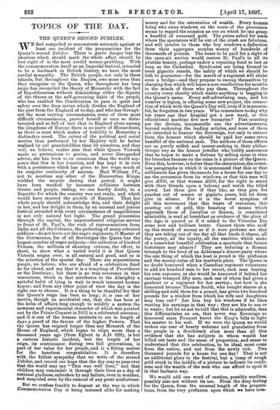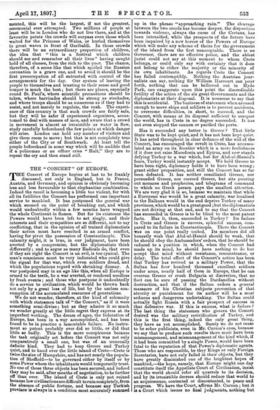TOPICS OF THE DAY.
THE QUEEN'S SECOND JUBILEE.
WE feel compelled to remonstrate seriously against at least one incident of the preparations for the Queen's second Jubilee. There is grave danger lest the idealism which should mark the whole affair should be lost sight of in the most sordid money-grubbing. With the commemoration itself as an Imperial festival, intended to be a landmark in British history, we have the most cordial sympathy. The British people, not only in these islands, but throughout the Empire, owe more even than they recognise to the Queen, who throughout her long reign has reconciled the theory of Monarchy with the fact of Republicanism without diminishing either the dignity of the throne or the self-governing habit of the people, who has enabled the Constitution to pass in quiet and safety over the deep ravine which divides the England of the past from the England of to-day, and who has through- out the most varying circumstances, some of them most difficult circumstances, proved herself at once so disin- terested and so full of tact that in England alone among the kingdoms of Europe there is no party of Monarchists, as there is none which makes of hostility to Monarchy a distinctive creed. The extent of the political and social service thus performed by her Majesty will be better realised by our grandchildren than by ourselves, and they will, we believe, realise also that while Queen Victoria made no pretensions to genius, and never disregarded advice, she has been inure conscious than the world sup- poses that this is her function, and has kept it in view with a persistence which has given to her reign much of its singular continuity of success. Had William IV., not to mention any other of the Hanovefian Kings, -wielded the sceptre during that period, it might have been marked by incessant collisions between throne and people, ending, we can hardly doubt, in a Republic for which the country was not ready, and which would have stunted the growth of Empire. That her whole people should acknowledge this, and their delight in her, and her delight in them, by an unusual and joyous festival attended with every circumstance of magnificence is not only natural but right. The grand procession through the capital, the unprecedented religious service in front of St. Paul's, the rush of representatives from India and all the Colonies, the gathering of many-coloured soldiers—do not leave out the negro regiments, 0 Master of the Ceremonies, for of all Sovereigns the Queen has the largest number of negro subjects—the collection of kindred Princes, the millions of shouting citizens, the effort, in short, to show what a varied world it is that Queen Victoria reigns over, is all natural and good, and so is the selection of the special day. There are superstitious people, we believe, who are afraid of a celebration fixed so far ahead, and say that it is a tempting of Providence or the Destinies ; but there is no true reverence in that -uneasiness, which in fact attributes to the Almighty a spiteful habit of lying in wait to wreck innocent human hopes ; and from any other point of view the day is the right one to choose. It is a thing to be thankful for that the Queen's reign has been so long ; it is one of her merits, though an accidental one, that she has been at the helm of affairs long enough to solidify a system the newness and experimental character of which was pointed out by the Prince Consort in 1855 in a celebrated sentence ; and it is one of the human instincts to see in length of day s a proof of the favour of the higher Powers. That the Queen has reigned longer than any Monarch of the House of England, which began to reign more than a thousand years ago (from Egbert in A.D. 828), is but a curious historic incident, but the length of her reign, its continuance during two full generations, is part of her value for her people, and is a fitting matter for the heartiest congratulation. It is therefore with the fullest sympathy that we write of the second Jubilee, and record our hope that the day may so pass over that the world may say "This was well done," and that children may remember it through their lives as a day of national gladness, unbroken by any failure, even in weather, and unspoiled even by the rumour of any great misfortune.
But we confess frankly to disgust at the way in which Commemoration Day is being misused alike for making money and for the ostentation of wealth. Every human being who owns windows on the route of the procession seems to regard the occasion as one on which he can grasp• a, handful of unearned gold. The prices asked for seats. where the spectators will be out of the crush are fabulous, and will involve to those who buy windows a deduction from their aggregate surplus money of hundreds of thousands of pounds. The sums to be paid for a sight of the open-air service would restore St. Paul's in all its pristine beauty, perhaps endow a repairing fund to last as long as the Cathedral. Syndicates are being formed to erect gigantic stands, the safety of which we should be loth to guarantee—for the march of a regiment will shake even a bridge—and they propose to recoup themselves by charging fees which will leave a sore recollection for months in the minds of those who pay them. Throughout the country every charity which wants anything is begging in the Queen's name. Every self-advertising man, and his number is legion, is offering some new project, the connec- tion of which with the Queen's Day will, even if it is success- ful, be forgotten in two years. Who remembers to-day why ten years ago that hospital got a new ward, or this- educational machine five new bursaries ? Past counting are the devices, innumerable are the advertisements, beyond reckoning the leading articles, and none of them are intended to honour the Sovereign, but only to extract- from the honour which should be paid her some extra, handful of the national cash. The authors of these efforts are as purely selfish and money-seeking in their philan- thropic way as the honest jeweller who boldly announces that he hopes to make a fortune by selling coins in rims for brooches because on the coins is a picture of the Queen.. Even this, however, is better than the ostentation, the count- less paragraphs in which it is announced that this or that millionaire has given thousands for a house for one day to see the procession from its windows, or that this man will give £300, or that woman £250, for the right to stand: with their friends upon a balcony and watch the titled crowd. Let them give if they like, as they give for peaches out of season or gigantic pears, but let them give in silence. For it is the worst symptom of all this movement that this waste of resources, this, pouring out of gold, this boasting of means which approach those of Lucullus or Seneca, is considered admirable, is read at breakfast as evidence of the glory of the Age, is quuted as if it added to the Victorian Era some new and brilliant lustre. Cannot those who sniff up this stench of money as if it were perfume see that they are taking out of the day all that lends it charm, all the poetry, all the loyalty, all the emotion which make of a somewhat boastful celebration a spectacle that future historians may admire ? They are reducing a Roman triumph to the level of an Alderman's dinner-party where the one thing of which the host is proud is the profusion and the money-value of his inartistic plate. The Queen is no doubt honoured when a Canadian regiment volunteers to add six hundred men to her escort, each man bearing his own expenses, as she would be honoured if behind her carriage tramped fifty men, each one of whom had given a gunboat or a regiment for her service ; but how is she honoured because Thomas Smith, who bought shares at a. shilling and sold them for a pound, has given two hundred pounds for a window from which his wife and daughters may lean out ? Let him buy his windows if he likes wasting his earnings in that way ; they are his to use or to waste ; but let us not be told that this is admirable, that this differentiates an era, that never was Sovereign so honoured since Fouquet burnt the King's bills to light his master to his seat. If we were the Queen we would reckon one roar of hearty welcome and gratulation from the people in a Southwark slum more than all this evidence that she has subjects in whom wealth has killed out taste and the sense of proportion, and sense to understand that this celebration, to be ideal, must come from the nation, and not from the newly rich. Two thousand pounds for a. house for one day ! That is not an additional glory to the festival, but a lump of rough gold stuck in the middle of a picture to indicate its costli- ness and the wealth of the men who can afford to spoil it in that barbaric way.
We would add one word of caution, possibly needless, possibly also not without its use. From the deep feeling for the Queen, from the unusual length of the prepara- tions, from the very profusion upon which we have corn- mented, this will be the largest, if not the greatest, ceremonial ever attempted. Two millions of people at least will be in London who do not live there, and at the favourite points the crowds will surpass even those which waited for the Princess of Wales, or hurled themselves in great waves in front of Garibaldi. In those crowds there will be an extraordinary proportion of children, the idea that " this is a festival which children should see and remember all their lives" having caught hold of all classes, from the rich to the poor. The chance, therefore, of a scene like that which spoiled the Russian coronation is a grave one, and to avoid it should be the first preoccupation of all entrusted with control of the arrangements for the day. Our system of leaving the people to themselves and trusting to their sense and good temper is much the best ; but there are places, especially round St. Paul's, where scientific precautions should be taken, where barricades should be strong as stockades, and where troops should be as numerous as if they had to resist, and not merely to regulate, the rush. The experi- ence of this country is that such crowds are fairly safe, but they will be safer if experienced organisers, accus- tomed to deal with masses of men, and aware that a crowd in movement is almost as irresistible as water in flow, study carefully beforehand the few points at which danger will arise. London can hold any number of visitors and give them room to move ; but that is not completely true either of the City or of Southwark. At least tell the people beforehand in some way which will be audible that if a policeman or an officer cries " Halt," they are to repeat the cry and then stand still.



































 Previous page
Previous page